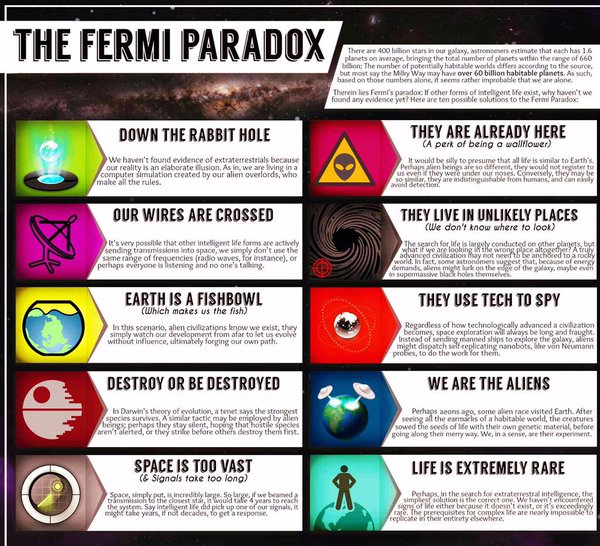
In the the milky way alone, there are 400 billions stars. There are perhaps 20 billion like our sun, with perhaps 1/5th of them with earth-like planets in their habitable zone - where life could exist. If 0.1% of these had life, there would be 1 million planets with life. This leads to an important question
Where are all the aliens?
It gets even worse when you recognize that the sun is much younger than many of the other stars in the galaxy, billions of years, in fact. Life on other planets around other stars in the milky way could have conceivably existed for more than 7 billion years before the earth was even formed. Even if one of these had become a space travelling super civilization we would have noticed by now. This is because an advanced alien species should be able to to colonize the galaxy in matter of 2 million years or less, assuming a slow, but exponential expansion.
This question regarding the apparent contradiction of the age abd vastness of space versus its apparent emptiness is called the Fermi paradox
The Great Filter
Some have speculated that there must be some point along their evolution that species were prevented from progressing. If this happened on most planets earlier in their evolution ( the great filter is before us), there may be many planets with single celled creatures, or simple animals out there, but it the evolution of life to a complex and advanced species like humans may be exceedingly rare.
However, the emergence of life itself may be a great filter, which would make the discovery of single celled life on Mars very bad. This is the possibility that keeps some scientists up at night, as such a common occurrence of life probably means the great filter is after us.
Of course, there is always the possibility that aliens are in fact out there, but just avoiding contact. Perhaps they have a prime directive, like in star trek. Or they don't interact, just like we don't interact with insects. Or they just hide, but then wipe anyone out once they reach a sufficiently advanced level of technology. Maybe colonizing the galaxy just isn't the goal when you get to that level of technology
Or maybe there is this chance, however remote, that we're the most advanced species currently in the galaxy, a blue dot all alone in the vast emptiness of space. Perhaps we will never know in our lifetime. Currently, the Fermi paradox is something so incredibly humbling, because it makes you feel so small, and because the ideas of the brightest minds of our era diverge so greatly on this, its as if we're back to arguing whether the earth is flat or the centre of the universe.
Regardless of whether there is a great filter, or our destruction by aliens in the future, or whether we're alone, I like to appreciate that we exist at all, and try to weigh the stress and busyness of the day in the light of our small place and time in the universe.
The short post was originally written for a Toastmasters speech, and only provides a basic overview of this fascinating topic. Most of the facts come from the excellent YouTube video on the Fermi Paradox by Kurzgesagt

 Posted by Jonathan Weyermann on December 6, 2019 at 12:12 AM
Posted by Jonathan Weyermann on December 6, 2019 at 12:12 AM




0 Comments
Add Comment